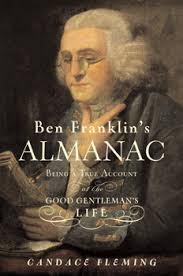Inventor’s Day: Benjamin Franklin’s Almanac
Listen to the Recess! Clip
| Author | John Cech |
| Air Date | 2/10/2004 |

Inventor’s Day: Benjamin Franklin’s Almanac Transcript
Ben Franklin was an American original — a self-taught popular writer, a political and social philosopher, a skilled politician and statesman, an entrepreneur, and, of course, an inventor. It’s Inventor’s Day tomorrow, and there are few other people in American history who live up to the title of Inventor quite as well as Franklin. He not only gave us the ideas for our first public library, volunteer fire department, and the lightening rod; but he also was a master of self-invention and reinvention. Not content to be a printer’s apprentice to his older brother, James, in Boston, Young Ben skipped out on his obligation and started over again, on his own terms, in Philadelphia. Not content to remain a printer, he became a newspaper publisher, then a writer, an engraver of paper money, a postmaster, the inventor of a stove, a founder of the American Philosophical Society — just a couple of years before he would discover the connection between lightening and electricity. And all of this, and much more, two decades before the American Revolution.
In her new book, Ben Franklin’s Almanac, Being a True Account of the Good Gentleman’s Life, Candace Fleming provides young readers with a biography that finds an engaging way to tell the familiar, albeit amazing story of Franklin. Fleming’s book has the look of one of the almanacs that Franklin, using the pen name “Poor Richard,” became famous for. She weaves together background sections about life in American in the 1700s, with episodes from Franklin’s life, some of them famous, others decidedly obscure, and all of them given a vividness through her use of vintage engravings, paintings, and other illustrations. For example, while still a boy, Franklin had discovered that if he flew a kite while swimming, he could hold onto the string with his toes and use the kite to pull him through the water.
One is impressed by so much about Franklin’s life — his unquenchable curiosity, his inventive creativity, his willingness to embark on new projects (he was sent as the ambassador to France when he was in his 70s), his unique and often provocative positions on everything from the choice of the Eagle as the symbol of America (he thought the bird had “bad moral character” because it was a predatory opportunist), to his feelings about the end of the Revolutionary War. “We are now friends with England and with all mankind,” Franklin wrote. “May we never see another war! For in my opinion there never was a good war or a bad peace.”